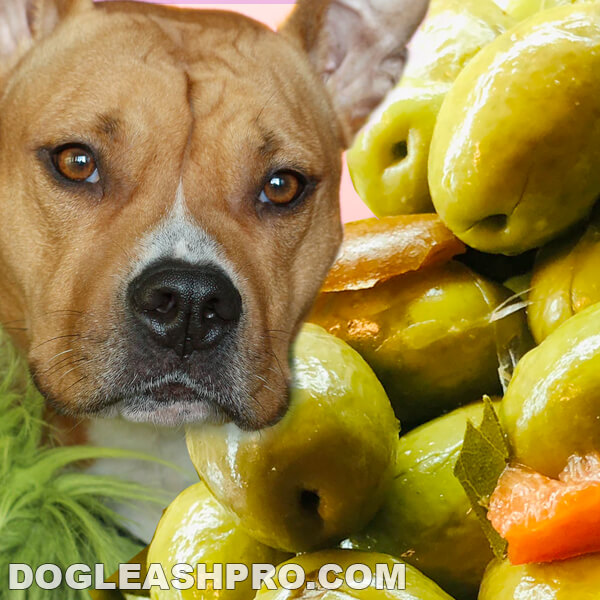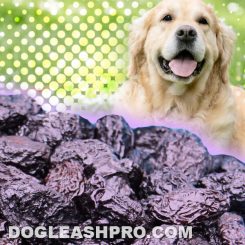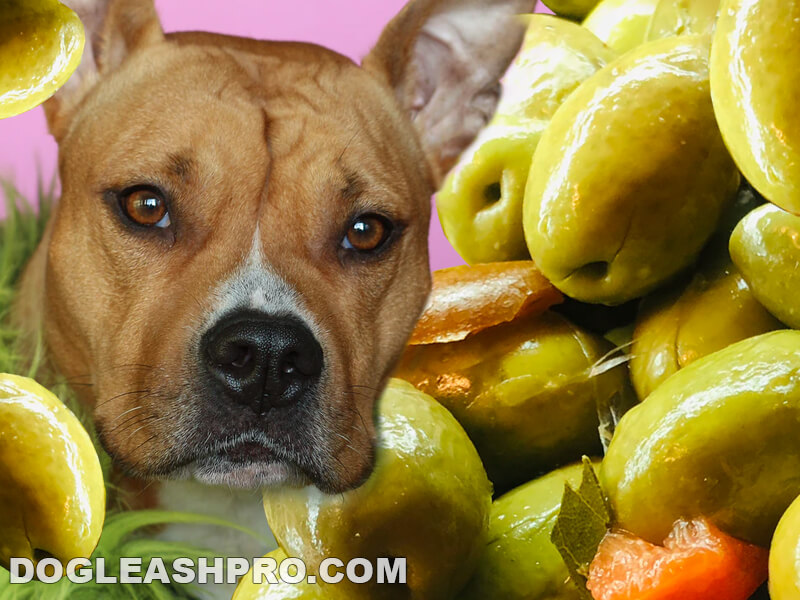
Have you ever ordered a salad or pizza with pepperoni, Olives, tomatoes, and mushrooms and wondered can dogs eat olives? You’ve come to the right article. We’ll discuss everything you need to know about dogs and Olives as well as the safest way for dogs to eat them.
Can dogs eat Olives? Yes, dogs can eat Olives in moderation as this fruit is not toxic to dogs. However, watch out for pickled or canned Olives that have been doused in saltwater since ingesting Olives that contain a lot of salt can cause sodium poisoning in dogs.
Table of Contents
Can dogs have Olives?
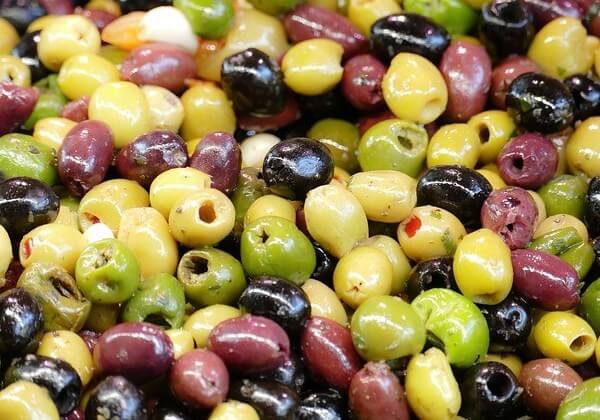
Yes, dogs can have Olives in small quantities and in moderation. Can dogs eat Olives safely? Yes, proper preparation of the Olives is crucial before feeding them to our four-legged friends. While Olives are safe for doggy consumption, there are some health risks every dog owner should know about and be aware of before feeding their K9 companions this small, tasty, and soft treat.
Let’s discuss the risk first and then learn how Olives can be beneficial to dogs.
Are Olives bad for dogs?

Olives are only bad for dogs if they are canned or pickled and there are still pits inside them. If you plan to feed your furry friends pickled or canned Olives, be aware that they may contain tons of sodium. Are Olives harmful to dogs? Olives that are doused in sodium water will be very salty and in this case, yes, Olives can be harmful to dogs because they can cause salt poisoning in dogs.
Keep in mind that a 33-pound dog should only have no more than 100 mg of sodium per day. Consuming too much salt can cause sodium poisoning in dogs and the symptoms are unpleasant.
Signs of salt poisoning in dogs include:
- Dehydrated and very thirsty.
- Frequent urination from drinking a lot of water in order to stay hydrated.
- Vomiting.
- Diarrhea.
- Loss of appetite.
- Lethargy.
- Muscle tremors.
- Weakness.
- Walking drunk.
- Fluid accumulation inside the body.
- Kidney failure (in severe cases).
- Seizure (in severe cases).
If you suspect your furry family member has salt poisoning, consult with your vet right away. This health situation requires immediate medical attention. You may be asked by the vet to bring your dog to the vet hospital for immediate treatment.
Handy Hint: If your pooch has kidney failure or kidney disease, there are initial signs such as extreme thirst, frequent urination, dry gums, weight loss, and anemia to name a few.
Are Olives poisonous to dogs? Only if the Olives are salted (as mentioned above) and coated in oil, seasonings, and garlic. Many dishes like pizza, salad, pasta dishes, and Mediterranean dishes contain tons of salt, seasoning, oils, and garlic or onion.
As you can see, Olives are only bad for dogs if they are doused in salt, have garlic, onion, or seasonings on them, and if they are soaked in alcohol. Always check to make sure the Olives are plain and pitted before feeding them to your pooch.
Are Olives good for dogs?
Yes, Olives are good for dogs if consumed in moderation. That’s because Olives contain plenty of minerals, vitamins, and antioxidants, which makes them a healthy treat for your canine friends.
Here are some of the nutritional benefits of Olives:
- Calcium.
- Protein.
- Vitamin A.
- Vitamin E.
- Vitamin K.
Olives also contain healthy fats and are a source of oleate, which promotes cognitive functions and heart health in dogs. Here are other great health benefits of Olives for our furry pooch:
- Weight loss for dogs on weight management.
- Healthy and moisturized skin and coat.
- Prevents cancer.
- Improve blood circulation.
- Lower cholesterol levels.
- Support immune health.
- Aid in digestion.
- Reduce inflammation.
It’s important to note that if your pooch is fed a well-balanced and complete diet, the additional nutrients in Olives aren’t really necessary to them.
Are Olives good for dogs to eat? Yes, Olives are good for dogs to eat, but be sure to only feed your furry friends Olives that are plain, which means they should be unsalted and without any added flavoring on them.
Are Olives safe for dogs?
Yes, plain and pitted Olives are safe for dogs, however, dogs should only eat Olives in moderation and it should only be a rare treat. That’s because Olives are packed full of proteins and healthy fats (see above) and if your four-legged friends eat too many Olives, they may be at risk of weight gain. The healthy fats in Olives can add excess calories that your pups do not need.
Thus, dog owners should only give Olives to their pooch every now and then and as a rare occasional treat. It’s best to avoid feeding Olives to your pooch every day. Feeding your pooch too many Olives can be potentially harmful to your dog’s health and the pits are also dangerous.
Are Olives safe for dogs to eat? Yes, Olives are safe for dogs to eat because they contain anti-microbial properties from a chemical called oleuropein, which is what gives the Olives their bitter taste.
Handy Hint: Bitter melon, as the name suggests, also tastes bitter. Can dogs eat this vegetable and are there health benefits to eating bitter melon? Find out in our article, Can Dogs Eat Bitter Melon?
Are Olive pits toxic to dogs?
No, Olive pits are not toxic to dogs, but they can be a serious choking hazard. If you know your canine friends accidentally ate an olive pit, it’s crucial that you observe them closely and carefully.
Olive pits can get stuck in your dogs’ throats or esophagus, which can block their airways. This not only makes it hard for them to breathe properly but also they can choke from the Olive pits. Keep in mind that a dog’s throat or esophagus is actually pretty small so something like an Olive pit can easily get stuck in there.
Also, if your dogs do manage to swallow the Olive pits, there’s a high chance that the Olive pits could get lodged in your pups’ intestinal tract. When this happens, your canine friends may experience the following:
- Loss of appetite.
- Abdominal pain.
- Frequent vomiting.
- Diarrhea.
- Lethargy.
- Dehydration from vomiting, diarrhea, and not being able to hold any water down.
- Bloating.
- Whining, crying, or hunching over.
If you notice any of these symptoms, call your dog’s vet right away. Time is of the essence here because blockage in the intestinal tract or stomach can cut blood supply to intestinal tissue. If the vet isn’t able to naturally force the Olive pit out of your dog’s intestine, surgery is necessary.
Since the Olive pits are hard, biting down on them could also crack the dog’s teeth. So, will Olives hurt dogs? Not necessarily. The Olives are fine for dogs, it’s actually the Olive pits that can hurt dogs.
Fun Fact: A dog’s vomit can tell you a lot about why your dog is vomiting. Their vomit comes in different colors and textures. Check out Dog Vomit Color Guide and use it as a reference whenever you need to!
Are Olives ok for dogs?
As you can see, Olives are ok for dogs. Are Olives okay for dogs to eat? Absolutely! As long as the Olives are plain and pitted, they should be fine for dogs to eat. By plain and pitted Olives, we mean that they are not doused in salt and do not have any seasonings, garlic, or onion (whether powdered, raw, or fresh), and have not been soaked in alcohol.
However, while Olives are not dangerous, toxic, or harmful to dogs, they are not the best snack choice for our furry family members. Olives were grown for human consumption only. Also, dogs can get the necessary nutrients, vitamins, and minerals that are in Olives from their regular meal or doggy treats.
Are raw Olives bad for dogs?
No, raw Olives are not bad for dogs, if your dogs ate a small and moderate amount. If your pooch ate a lot of raw Olives, then they may experience an upset stomach.
Some dogs that are sensitive to raw Olives or Olives, in general, may vomit or have diarrhea. The vomiting and diarrhea should pass after a few days and your pooch will be back to eating and drinking normally, being happy and alert.
If you’re worried, it never hurts to call your vet and ask for their advice and suggestions on what you should do.
You may be interested in: Puppy Has Diarrhea But Still Playful
Can dogs eat black Olives?
Yes, dogs can eat black Olives. Black Olives are safe for dogs if they are pitted and plain. When Olives are black, it means that they are fully ripe. Olives contain an enzyme called catechol oxidase which is what causes them to change colors from green to reddish-brown and finally to black.
Can dogs have black Olives?
Yes, dogs can have black Olives on the condition that they are plain without any seasoning and the pits are removed. However, all dog owners should be aware of the following potential health risks of feeding black Olives to their pooch. Let’s take a look at what they are.
Are black Olives bad for dogs?
Black Olives can be bad for dogs if they have pits inside, which can be a choking hazard or cause intestinal blockage in dogs. The black Olive pits can get stuck in your dog’s throat and block crucial airways, which will prevent your dog from breathing. When Olive pits can lodge in the intestines, it can cause intestinal blockage and this can cause severe gastrointestinal issues.
Both of these situations result in emergencies and require immediate medical attention.
Black Olives can also be bad for dogs since a typical black Olive contains about 32 milligrams of sodium and our furry friends only require about 13.3 milligrams of salt every day.
If the Black Olives are past their sell-by date or are rotting, it’s best to throw them away instead of feeding them to your pooch. Black Olives could develop mold and the mold may contain tremorgenic mycotoxins, which can cause tremorgenic mycotoxin intoxication or neurotoxicosis in dogs.
Are black Olives good for dogs?
Yes, black Olives are good for dogs because like other Olives, they contain minerals, vitamins, and healthy fats. However, it’s important to note that dogs can get these nutrients from their regular, healthy, and well-balanced dog food.
Are black Olives ok for dogs?
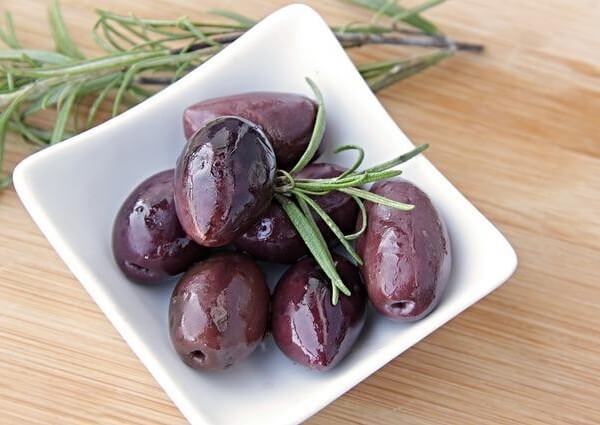
Black Olives are ok for dogs as long as your dogs consume them in moderation. Consuming too many black Olives can cause weight gain and potential salt poisoning.
Can dogs eat pitted black Olives?
Yes, dogs can eat pitted black Olives. Make sure the pitted black Olives are also plain. Both of these combinations make black Olives safe for dogs to eat.
Can dogs eat canned black Olives?
No, dogs should not eat canned black Olives as they contain way too much salt and can potentially cause sodium poisoning in dogs. Avoid feeding your pooch canned black Olives and keep them away from your pup.
Can dogs eat green Olives?
Yes, dogs can eat green Olives. Can dogs eat Olives green? Yes, dogs can have Olives green. Green Olives are picked from the tree sooner than the black Olives so they are actually still immature and are quite firm. Green Olives also taste quite bitter and are a bit pungent in smell, but dogs can still eat them.
Handy Hint: Another green alternative is Brussel sprouts. Check out Can Dogs Eat Brussel Sprouts? to find out how this green vegetable can be beneficial to dogs.
Can dogs have green Olives?
Yes, dogs can have green Olives because the nutritional content in green Olives is still the same as other Olives of different colors.
Green Olives are safe for doggy consumption, but be sure that your canine friends eat green Olives in small quantities and in moderation because they do contain a somewhat higher sodium level than black Olives.
Can dogs eat green Olives with pimentos?
Yes, dogs can eat green Olives with pimentos. Pimentos are the red stuffings in the center of the green Olives that are safe for doggy consumption. The green Olive pits are usually removed first before the pimentos are stuffed inside. Pimentos peppers are sweet and help to balance out the strong pungent smell and salty taste.
You may be interested in: Can Dogs Eat Banana Peppers?
Are green Olives bad for dogs?
Green Olives can be bad for dogs if they are doused in salt or cured in a brine mixture. Many have noticed that green Olives are very salty and that is because they have been cured in a brine mixture. Since fresh and raw green Olives are still immature, they are pretty bitter. When green Olives are cured in a brine mixture, it helps to remove some of that bitter taste.
What results are extremely salty and sour green Olives. This can be bad for dogs because salty green Olives can potentially cause dogs to ingest too much salt and they can get sodium poisoning. Scroll to the middle of the page to take a look at some of the signs and symptoms of salt poisoning in dogs.
Green Olives are bad for dogs if there are still pits inside. Before feeding any green Olives to dogs, make sure the pits are removed. Additionally, double-check that there is no other stuffing in the green Olives other than pimentos. Sometimes green Olives are stuffed with garlic, onions, or various types of cheese and these are very harmful to dogs.
Are green Olives good for dogs?
Yes, green Olives are good for dogs if consumed in small quantities and in moderation. As mentioned above, green Olives contain minerals, vitamins, and healthy fats. However, dogs should only eat a small quantity of green Olives because eating too much can cause weight gain.
Additionally, the minerals and vitamins found in green Olives can also be found in your dog’s regular well-balanced dog food so it’s really not necessary to feed dogs green Olives or any other Olives at all.
Can dogs eat pitted green Olives?
Yes, dogs can eat pitted green Olives. When the green Olive pits are removed, it makes the green Olives safe for dogs to eat.
Can dogs eat unsalted green Olives?
Yes, dogs can eat unsalted green Olives in moderation. Make sure the unsalted green Olives are also pitted or you can remove the pits before feeding them to your pooch.
Can dogs eat kalamata Olives?
Yes, dogs can eat kalamata Olives in moderation and as a rare occasional treat. Make sure the kalamata Olives are pitted. If not, it’s best that you remove the kalamata Olive pits first before sharing them with your pooch.
Similar to green Olives, kalamata Olives also contain high levels of sodium so try not to offer your pooch too many kalamata Olives.
Can dogs eat Olives from the tree?
No, dogs should not eat Olives from the tree. Although the Olives from the tree are free from harmful preservatives and salt seasonings, they still have pits inside which makes them harmful to our canine friends.
Not only will the pits from the Olives be a choking hazard, but our furry friends’ bodies will not be able to properly digest the pits, especially when they’ve eaten several Olives. In addition, the Olive pits may get stuck in their stomach or digestive system and lead to serious health issues.
These health problems include intestinal blockage and bowel obstruction. Your pups may start to feel abdominal pain, bloating, weakness, dehydration, and may even start to vomit or have diarrhea.
In the majority of these cases, surgery is necessary to remove the Olive pits that are causing the blockage and bowel obstruction.
Intestinal blockage and bowel obstruction require immediate medical attention. If you suspect your pooch has eaten Olives from the tree and is having some form of digestive problem, we highly recommend that you contact your vet right away. If this isn’t attended to, it is possible that dogs can die of intestinal blockage within 3 to 7 days.
Thus, if you’re growing an Olive tree, make sure to put a fence around the tree so your pooch doesn’t get curious and start eating Olives from the tree. If your dog eats Olives from trees, be sure to monitor him closely and make sure he doesn’t eat more than one or two Olives.
Can dogs eat black Olives and mushrooms?
Yes, dogs can eat black Olives and certain types of mushrooms. Please keep in mind that the black Olives need to be plain and pitted if you plan on feeding some to your canine friends.
The difference between black and green Olives is that the black Olives are ripe. Green Olives are also safe to feed your furry friends, however, since this is human food, we recommend that you only give Olives to your four-legged friends in moderation.
Here are some of the advantages and disadvantages of adding black Olives to your dog’s nutrition:
| Advantages | Disadvantages |
| Black Olives are high in Vitamin E and rich in antioxidants, both of which are needed for our furbabies to remain healthy. | Canned Black Olives have high sodium content, especially when they are brined. Too much sodium intake can cause dehydration and pancreatitis in dogs. |
| Black Olives contain good fats that can help lower cholesterol. | The pit in the Black Olives can be a choking hazard. Make sure you remove the pit in the middle before feeding them to your pooch. This way your dog will not be able to accidentally swallow it. |
| Black Olives can also help reduce inflammation and help prevent arthritis caused by old age. | Some Black Olives are stuffed with other ingredients, like garlic, which can be dangerous to your canine friends when consumed. Be sure to only feed your pup plain and fresh Black Olives. |
When it comes to mushrooms, depending on which types of Mushrooms, they can be risky to feed your pooch. While some mushrooms are edible, such as Shiitake, Portabella, or White button, most can be poisonous to dogs.
Store-bought mushrooms are generally safe for doggy consumption, but they can be mixed with other ingredients like garlic or onion that are toxic for dogs.
Want more information? Before you feed your dog mushrooms, be sure to check out Can Dogs Eat Mushrooms? to find out which types of mushrooms are dangerous and poisonous to dogs.
Can dogs eat Olives and mushrooms?
Yes, dogs can eat pitted Olives and certain types of mushrooms. Olives are not toxic for dogs, so it is safe to feed your canine friends black, green, or any type of Olives.
Just like the ripe black Olives, the green ones or other types of Olives are rich in vitamins and minerals, contain good fat, are a good source of vitamin E, and can help reduce the inflammation of a dog’s joints.
A plain unsalted Olive can be a healthy snack for your dogs every now and then; however, you must remember to feed your dogs Olives in moderation.
Meanwhile, only certain types of mushrooms are safe for doggy consumption. Never feed your pooch wild mushrooms.
Be cautious when you go foraging with your furry friend because he may accidentally sniff and eat a wild toxic mushroom. You might think a dog can distinguish which mushroom is toxic or not, but in fact, some mushrooms have an appetizing smell that can confuse your four-legged friends.
Store-bought mushrooms are generally safe for dogs. Some of the safe mushrooms we’ve listed above can be eaten by your dogs raw or cooked. They contain Vitamin B, D, antioxidants, and minerals.
However, if your pooch already has an alternative source of these vitamins, you can opt not to feed them mushrooms, just to err on the safe side. If you choose to feed our furry family members cooked mushrooms, make sure you only use ingredients that are safe for them. Avoid using oil, butter, salt, pepper, onion, and garlic as those are dangerous to dogs.
So, Can dogs eat Olives?
Dogs should only eat Olives in moderation. A small number of Olives won’t hurt your dogs, however, be sure the Olives are pitted and plain. Be very careful when feeding Olives to your pups and make sure to prepare the Olives properly before sharing them with your dogs.
Olives with pits inside can be a choking hazard. Our furry family members can choke from eating Olives with pits or have intestinal blockage. Both of these cases require immediate medical attention.
Our dogs will eat anything and everything we give them so it’s our responsibility to know what to feed them and how to properly prepare the Olives before sharing them with our pups.
DISCLAIMER: THIS WEBSITE DOES NOT PROVIDE MEDICAL ADVICE
The information, including but not limited to, text, graphics, images and other material contained on this website are for informational purposes only. No material on this site is intended to be a substitute for professional veterinary advice, diagnosis, or treatment. Always seek the advice of your veterinarian or other qualified health care provider with any questions you may have regarding dietary needs.
Resources:
https://en.wikipedia.org/wiki/Olive
https://www.newworldencyclopedia.org/entry/Olive

With over five years of specialized experience as an animal writer, my expertise lies in dog nutrition, health, behavior, grooming, and training. I am dedicated to delivering helpful and informative content that caters to the well-being of our furry friends. My primary goal is to empower pet owners with knowledge and ensure our canine companions thrive in health and happiness. In my free time, I love volunteering at local dog rescue centers.
